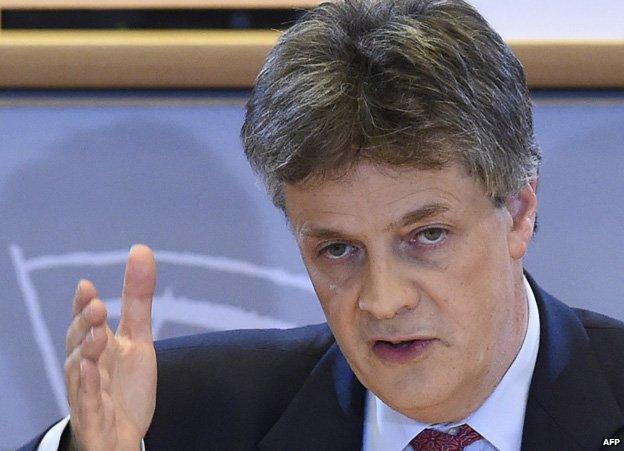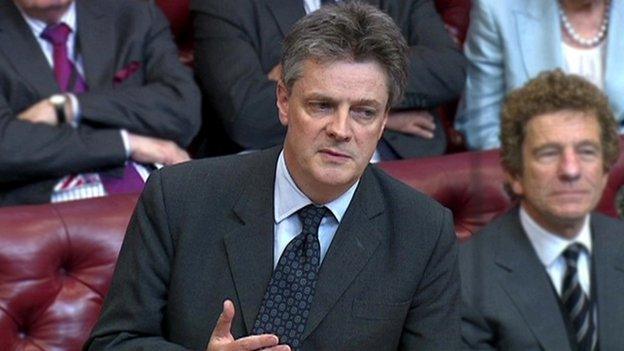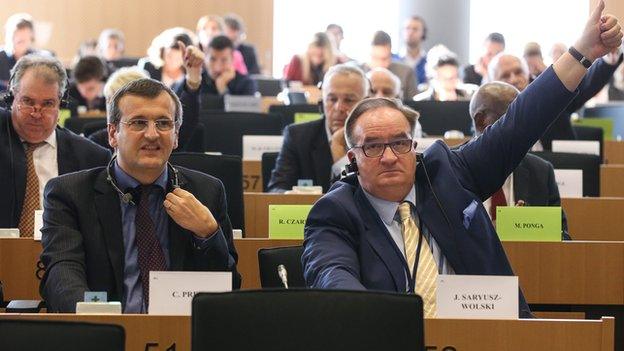UK's Lord Hill recalled for more questioning by MEPs
- Published

Lord Hill remains an unknown quantity for most officials in Brussels
The UK's candidate to join the European Commission, Lord Hill, has been asked to attend a second hearing of MEPs to assess his suitability for the job.
The Conservative politician, nominated by UK PM David Cameron, is in line for a top job running financial services.
On Wednesday, he told MEPs he will act for all 28 EU member states and is not a representative of the City of London.
But the Conservative group in Brussels said Lord Hill would be recalled for a second confirmation hearing next week.
All 27 commissioners nominated by EU states must get the approval of the European Parliament before they can join Commission president Jean-Claude Juncker's top team.
Mr Juncker's decision to give Lord Hill the coveted brief in charge of financial services, financial stability and capital markets union was seen as a coup for the UK, given the sector's vital importance to its economy.
Clear and simple
But some MEPs worry that he may be too close to City of London interests.
His public cross-examination was broadcast on the BBC's Democracy Live website.
"I am not here as a representative of the City of London, I am here to represent the European interest," he told MEPs at a key hearing in Brussels.
"I have a very clear and simple view - it is in the interests of the EU for Britain to be in it, and for Britain to be in the EU."
The UK's ruling Conservatives have promised to hold an in/out referendum on EU membership in 2017, provided they can renegotiate the UK's membership terms before then.

Chris Morris, BBC Brussels correspondent, writes:
Lord Hill's performance was competent but underwhelming. He made no catastrophic mistakes, but plenty of MEPs in the room were less than impressed by his grasp of the detail.
"Charming but empty," said the Green MEP Philippe Lamberts.
Perhaps Lord Hill should be given the benefit of the doubt - he's had less than three weeks to master a portfolio of considerable technical complexity.
In fact he was probably lucky that many of the questions were less probing than expected.
Greens MEP, Philippe Lamberts: "On every single question Lord Hill had no concrete answer"
There were also signs of the difficult political balance Lord Hill will have to maintain in Brussels.
He described himself as a "consensual, pragmatic, European politician" - not a phrase destined to win him many supporters on the Tory backbenches in London.
He promised to work in the general interest of all 28 EU countries, but many MEPs still see him as David Cameron's man.
"I'm a great believer that actions speak louder than words," he told me. "If I'm confirmed, everyone will see that I will approach the job in the way they should expect all commissioners to approach it. I'm very clear that that is my task."

Plum job
When pressed to disclose any conflict of interest Jonathan Hill stressed that he had cut all ties with his former consultancy businesses in London. "I have no shares in any business at all and am not on the board of any company," he said.
His question-and-answer session with MEPs lasted nearly three hours.
But, according to one MEP, Lord Hill had failed to explain how he thought the financial sector should develop and there were "many critical voices" about his nomination.
Jonathan Hill will not work on the vexed question of bankers' bonuses. That will be the responsibility of the new EU justice commissioner-designate, Vera Jourova from the Czech Republic.
The UK government is challenging the new EU directive on bankers' bonuses in the European Court of Justice.
But Lord Hill will oversee the launching of a new EU capital markets union - a key issue for the UK, as the City of London hosts nearly 40% of the EU's wholesale financial markets.

Lord Hill's career
Born in north London in July, 1960
Read history at Cambridge University
1980s - Special adviser to Kenneth Clarke in Conservative cabinet
Early 1990s - Adviser to then PM John Major during EU's Maastricht Treaty negotiations, which launched euro
1994-1998 - Senior consultant at lobbying firm Bell Pottinger Group
Founding director of Quiller Consultants
2010 - Becomes a Life Peer as Baron Hill of Oareford and junior education minister
Serves as leader of House of Lords and leader of Conservatives in the House

A capital markets union would aim to make companies in the EU less reliant on banks for finance. Currently in the EU, banks account for about 50% of that finance, whereas in the US, capital markets play a much bigger role in lending to companies.
In written answers to MEPs' questions, external Lord Hill pledged to act quickly to develop the EU's capital markets "as there is an urgent need to boost and diversify the funding of our economy".
He acknowledged that there were some tensions between member states using the euro and those outside the single currency.
"My task is to work to reconcile those tensions... and make sure that in the banking union the 'euro outs' feel as comfortable as the 'euro ins'," he said.
Some MEPs asked him to prepare an EU-wide deposit guarantee scheme for bank customers, but he said that was not yet on his agenda.
Mr Juncker has shaken up the structure of the Commission, appointing powerful vice-presidents to oversee some key policy areas.
Lord Hill's work will be overseen by Mr Juncker's "right-hand man", Frans Timmermans, and probably also by economics chief Jyrki Katainen, though it is not yet clear to what extent.
Lord Hill will have to ensure the smooth running of the EU's new banking union, including tighter supervision of Europe's banks to prevent anything like the 2008 financial crash happening again.
- Published1 October 2014
- Published18 September 2014

- Published29 September 2014
